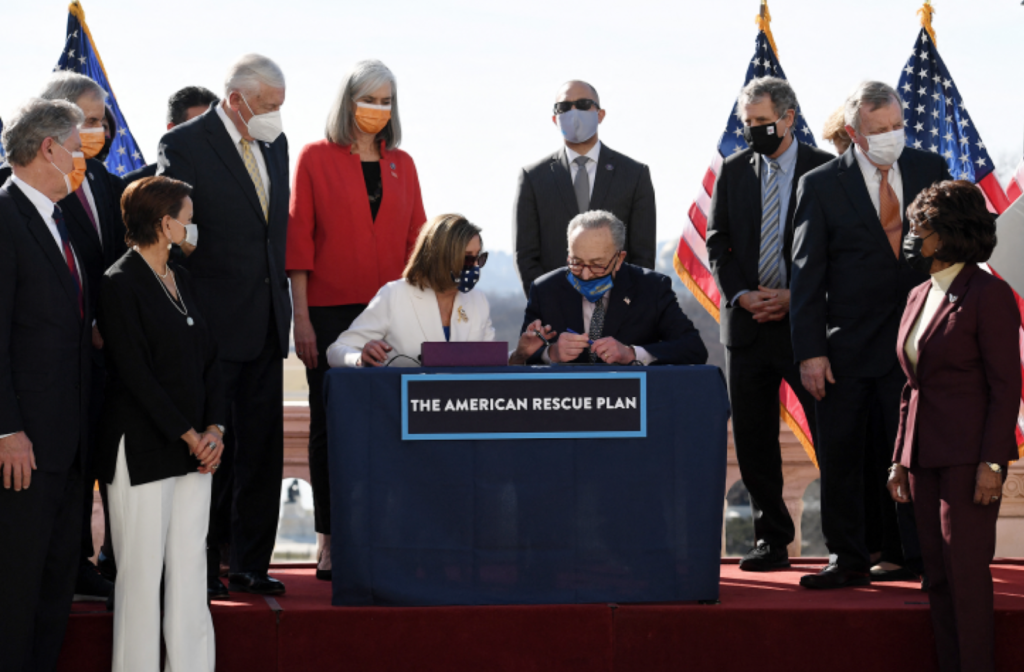Signed, Sealed, Delivered: With Biden’s Support, Congress Passes American Rescue Plan Act

Image Courtesy of The Commonwealth Fund
By Justin Lamoureux
Recent weeks have seen a number of substantial developments in the nation’s planned response to the COVID-19 pandemic. A more efficient timeline for vaccine availability and social guidelines for fully vaccinated Americans are only two examples of such progress. Perhaps most significant is the approval of a better developed plan to provide national economic (and monetary) relief.
Designed to provide widespread relief to various sectors, the American Rescue Plan Act is best known for its price tag: $1.9 trillion divided between 12 different categories. The largest – and most discussed – allocation is $410 billion for economic impact payments. These will be shared with eligible Americans in the form of $1,400 stimulus checks. Eligibility for said benefit is determined primarily by an individual (or household)’s pre-pandemic income: only single filers earning less than $80,000 per year can apply to receive payment. By the same token, only heads of household earning under $120,000 per year, and married couples (filing jointly) earning downwards of $160,000 per year, are entitled to compensation.
Stimulus checks, while significant, are only the tip of the iceberg. Other categories addressed by the American Rescue Plan include state and local government aid ($350 billion), expanded unemployment insurance ($289 billion), as well as transportation and infrastructure, financial services, and other education and labor ($268 billion).
President Biden signed the bill into law on Thursday, March 11 – the 1st anniversary of when COVID-19 was declared a global pandemic – after it was approved by both chambers of Congress.
The House approved the act 220 – 211, with only one Democrat crossing party lines to vote against it.
The Senate, meanwhile, passed it by an even narrower margin: 50 – 49. This vote was exclusively along party lines.
Prior to the passage of the American Rescue Plan Act, Congress spent considerable time negotiating its logistics. In February, a group of Senate Republicans met with President Biden in the Oval Office to discuss concerns they had regarding the bill. A significant reservation they held was that excess funds were being allocated to individuals and businesses who have not experienced considerable economic hardship as a result of the pandemic. Biden and congressional Democrats, meanwhile, had concerns that failing to designate an adequate budget for relief could result in a slowed recovery, as happened during the 2009 financial crisis.
Unsurprisingly, reaction to the act’s passage was marked by party polarization. The response from many prominent Republicans was highly charged – in an op-ed published by FOX News, U.S. Senator Marsha Blackburn (R – TN), and Tennessee Governor Bill Lee classified the Act as a “bailout that hurts red states,” and “offers up big blue state playday.” Their objections to the bill included a multitude of criticisms. For example, only 9% of total funds are dedicated to vaccine distribution, expanded testing, and health care jobs. Billions more, they note, are dedicated to earmarks and line items that will disproportionately benefit Democratic states. Furthermore, Blackburn and Lee took issue with the bill using unemployment rates to determine final state payouts. They argue this will result in blue states benefiting from the tax dollars of red states whose economies did not experience as much decline. Tennessee, for example, will lose $164 million, while New York, New Jersey and California will collectively gain almost $9 billion. Evidently, the metric used for determining reimbursement levels disproportionately benefits “wealthy hospitals in blue states,” while sending rural hospitals “into a budget freefall.” Blackburn and Lee worry this reflects broader geographic inequities in how the act addresses the pandemic.
Conversely, Democrats’ response to the bill’s passage was resolutely positive. During a vaccine announcement on Wednesday, Biden thanked House Speaker Nancy Pelosi for its final passage, calling the act a “historic victory for the American people.” While discussing the act’s primary objectives, the president also alluded to subsequent phases of recovery. Pelosi declared it was “a momentous day in the history of our country,” while Schumer commented that the act’s passage will expedite the nation’s overall recovery from the pandemic. “Help is on the way,” the Senate Majority Leader declared. “Vaccines will be available far more quickly to far more people in a shorter time. Our schools will open safely and more quickly than we thought.”
Despite President Biden’s efforts to promote bipartisanship during negotiations, the process of facilitating COVID-19 relief ultimately evolved into a highly partisan affair. Nevertheless, the legislative success of the American Rescue Plan Act constitutes an important milestone for the Biden Administration. For starters, it demonstrates that Congress and the Biden Administration are seemingly dedicated to assisting working families during times of considerable hardship, as well as to ensuring that states and federal agencies have the resources they need to expedite recovery. Not to mention, it provides Democrats with a legislative accomplishment that could have far-reaching implications.
Perhaps most importantly, however, it represents another step towards a return to normalcy.
The American Rescue Plan Act may not dramatically alter the trajectory of the nation’s COVID-19 response overnight; coordinating the prescribed approach will take time. But in the coming weeks and months, it will likely provide many individuals, businesses and agencies with the support needed to effectively move past the pandemic.







